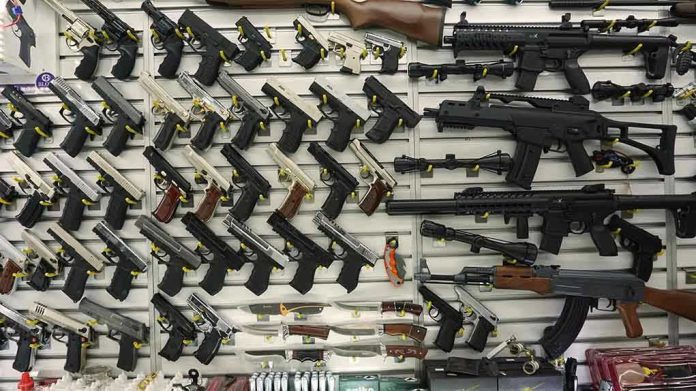
With the NFA tax cut to zero, a multistate push now targets the federal registry itself—potentially the most significant win for Second Amendment protections in decades.
Story Snapshot
- Texas and reportedly 14 states are aligning with a lawsuit strategy to end NFA registration for suppressors and short‑barreled firearms.
- Congress set NFA tax stamps to $0 in July 2025’s “One Big Beautiful Bill,” sparking a new constitutional challenge.
- Major gun-rights groups (GOA, NRA, SAF, FPC, ASA) coordinated the litigation plan immediately after the law’s passage.
- Courts will decide whether a registry can survive after its tax basis disappears, with national implications for gun owners.
What changed: $0 tax ignites a new constitutional front
Congress eliminated the $200 NFA tax for suppressors, short‑barreled rifles and shotguns, and AOWs in the 2025 reconciliation package commonly called the “One Big Beautiful Bill,” effective January 1, 2026. Advocacy and industry reporting explain that the NFA was historically upheld as a tax measure; with revenue set to zero, challengers argue the registry’s constitutional footing has collapsed. The theory draws an explicit parallel to litigation over the ACA mandate once Congress zeroed that tax, creating a fresh path distinct from past 2A cases.
Gun Owners of America, NRA-ILA, the Second Amendment Foundation, Firearms Policy Coalition, and the American Suppressor Association announced in early July 2025 a coordinated lawsuit to invalidate the NFA registration scheme. Their statements emphasize that registration historically functioned to prove tax payment; if no tax is collected, the registry becomes a regulatory barrier without the taxing power’s justification. This timing followed the bill’s signing on July 4, 2025, positioning the coalition for immediate federal court filings.
Texas leads a state coalition; filings pending full plaintiff list
Reports indicate Texas and fourteen other Republican-led states are joining or aligning with the litigation, adding state AG horsepower to the national groups’ strategy. Public materials from the organizations confirm the litigation track but do not include a finalized public docket naming every state; monitoring forthcoming federal filings will be necessary to verify the complete roster. Even without a published list, coordinated state participation would expand standing, intensify pressure on DOJ and ATF, and signal a broader federalism challenge.
For gun owners, the immediate practical note is straightforward: until a court rules, ATF’s registration and approval requirements still apply, with the tax reduced to $0 starting January 1, 2026. Dealers and applicants may face a hold‑and‑see environment as courts consider preliminary relief. Industry observers expect either a near‑term surge in submissions anticipating deregulation, or cautious delays as buyers await clarity. The coalition’s goal is national relief that would reshape suppressor and SBR/SBS markets if the registry falls.
The legal theory: if no tax, can the registry stand?
Sonzinsky v. United States (1937) sustained the NFA as an exercise of Congress’s taxing power, not as a freestanding police regulation. Plaintiffs now argue that when Congress zeroes the tax, the constitutional prop disappears—like post‑2017 ACA litigation that questioned the mandate without revenue. Federal defenders are expected to test alternative grounds, such as the Commerce Clause or administrative authority, to preserve registration independently. Courts will have to resolve whether a $0 tax can still sustain a national registry of covered items.
If plaintiffs prevail, the decision could invalidate NFA registration for suppressors, SBRs, SBSs, and AOWs nationwide, ending a century‑old framework that has slowed lawful ownership and chilled self‑defense innovation. If the government wins, it would confirm that Washington can maintain federal registries even after the underlying tax vanishes, with ripple effects for future challenges to ATF rules and other tax‑adjacent regulatory schemes. Either way, the result will set a durable precedent for constitutional limits on regulatory power.
What to watch: filings, defenses, and market impacts
Watch for the complaint’s filing, venue choices, and the official list of state plaintiffs. Expect DOJ to oppose preliminary injunctions and to argue that public safety requires continuity in ATF oversight. Gun-rights groups will press that a $0 tax strips the legal rationale, turning registration into an unlawful barrier to lawful arms. Markets may react quickly; if courts enjoin the registry, suppressor and SBR/SBS availability could expand, with compliance shifting to standard background checks under existing federal and state law.
For conservatives who value limited government and constitutional fidelity, the stakes are clear. If the NFA registry rests on a tax that no longer raises revenue, ending the registry restores the original balance: Congress cannot smuggle sweeping controls through the tax code when no tax remains. The coalition’s case is a direct test of that principle. Until the courts speak, stay compliant, watch the docket, and prepare for a ruling that could redefine federal firearms regulation.
Sources:
NRA and 2A Allies Announce NFA Lawsuit
SAF Issues Joint Statement on NFA Registration Challenge
Hearing Protection Act 2025 (Silencer Shop) – Analysis of $0 NFA tax and implications






